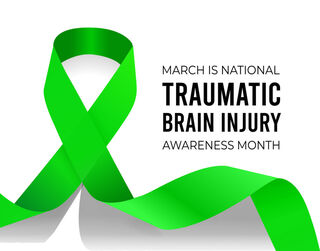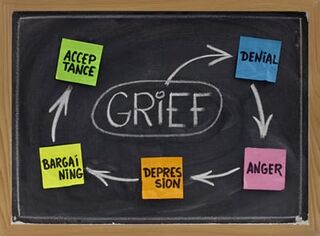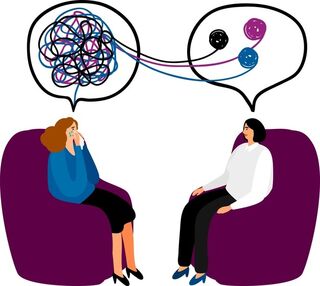Grief
Grief: The Overlooked Brain Injury Symptom
Bringing awareness to a necessary step in brain injury recovery.
Posted March 21, 2022 Reviewed by Tyler Woods
Key points
- March is Brain Injury Awareness Month, and while we focus on raising awareness about brain injuries, we also need to talk about grief.
- Symptoms of grief are sometimes confused with Post Concussion Syndrome and/or Post-Traumatic Stress Disorder symptoms.
- Processing grief of self is a necessary part of recovery after a traumatic brain injury.
- Grieving the loss of your former self after traumatic brain injury is often misunderstood or overlooked.

March: Brain Injury Awareness Month
In March 1990, I was in a 60-mph head-on auto accident, and four months later I had surgery which left a hole in my left frontal lobe. Doctors told me I would never walk or talk again. Prior to the accident, I was a successful health practitioner, managing a private practice. Devastated and fighting for survival, I eventually lost my practice. My marriage failed. I struggled to be a mother to my three children under the age of 10. My life, as I knew it, was over. I spent many years grieving and mourning the losses, but especially the loss of self.
Grief: The Overlooked Brain Injury Symptom
Most people relate grief to the loss of a loved one, yet it can occur after a life-changing event, such as a brain injury. If you are unable to live your life as you did before the injury, it is normal and common to grieve the loss of the person you used to be.
The idea of grieving following a brain injury has been largely overlooked by doctors; even the most highly trained psychotherapists sometimes may lack knowledge about brain injury, much less about grieving the loss of self. Therefore, it is important to find the right professional who can support your recovery journey and who truly understands the sadness and mourning you feel.
Grief, PTSD & PCS: What am I experiencing?
A brain injury survivor will likely suffer from one, if not all of the following conditions: grief, post-concussion syndrome (PCS), and/or post-traumatic stress disorder (PTSD), depending on the circumstances of the event. The symptoms of these three conditions are similar and can overlap, making it challenging to properly diagnose and treat. The process of grieving the loss of self is often confused with PCS or PTSD.
- Post-Concussion Syndrome (PCS): Ongoing symptoms following a brain injury that don’t resolve within a few weeks, are generally classified as Post-Concussion Syndrome (PCS).
- Post-Traumatic Stress Disorder (PTSD): PTSD is a psychological issue that occurs when someone experiences a traumatic event.
- Grief: Grief is the deep mental pain that comes from a loss. Grief over the loss of self is something almost every brain-injured person will go through. However, the recognition of grief as a possible cause of post-injury behavior has eluded many physicians and mental health professionals, as well as survivors themselves.

Phases of Grief
In the immediate aftermath of a brain injury, you may experience shock, numbness, emptiness, remorse, and the desire to regain what you have lost. These feelings often follow in the weeks or months after sustaining a brain injury. Healthy grieving can be more prolonged, pervasive, and complicated than you may realize.
In most cases, the phases of grieving include the following:
- Denial of the loss: Being truly unaware of losses. In the case of any post-injury deficits, you may firmly believe that you are no different from before.
- Anger: Often manifests itself in expressions of rage and bouts of aggression over the injustice of the loss.
- Bargaining: Here, you try to set terms that will change the eventual outcome—as in, “If I do [fill in the blank], things will be different.”
- Disorganization: At this stage, you feel confused and have difficulty organizing your thoughts and behavior.
- Despair: This phase involves the loss of hope that things will get better.
- Depression: Experiencing emotions of hopelessness, inadequacy, worthlessness, and/or anxiety. You may have problems eating and sleeping, exhibit withdrawn behavior, and even think of suicide.
- Acceptance or resolution: You acknowledge your limitations and feel comfortable knowing that life can continue.

Working Through Grief
I often think of myself as a house that was hit by a hurricane and then restored. Brain injury destroyed portions of the house, which was me. The years of rehabilitation were like adding new lumber and materials onto the original design. To all appearances, the restored house is the same, but it is not. It is a composite of the old and the new. I look and sound similar to my old self, but I’m really a blend of the old and the new. In the years since my brain injury, I’ve done a lot of grieving, and I’ve finally learned to accept who I am now.
Grieving is an emotionally painful but necessary part of life. Fortunately, there are many approaches to assist in working through the stages of grief. On a practical, everyday level, simply recognizing and accepting the grieving process can do a great deal to make it easier to bear. As you undergo the grieving process, you may find the following suggestions helpful:
- Acknowledge the reality of your loss: Family and friends may want you to “snap out of it” or “get a grip.” Although they may think this is helpful advice, you cannot get on with your life until you work through your grief. The first step is to fully recognize and accept that your brain injury has made you a new person.
- Identify and express your grief: Therapy will help you to experience the pain and intense feelings that accompany the loss of self. Join a support group. Find a grief counselor. Seek help from a professional experienced in brain injury and grief.
- BIAA Virtual Support Groups: Seeking support online can be very helpful. Whether you are an individual living with a brain injury or a caregiver, it helps to know you are not alone. The Brain Injury Association of America can help you find virtual support groups for you and your family.
- Acknowledge conflicting feelings: There may be times where you view your survival as a second chance, while at other times you may see it as nothing but a burden. Such mixed feelings are normal, but if you do not recognize them, this inner conflict can slow down the resolution of your grief. Instead of denying conflicting feelings, work toward a balance between positive and negative feelings about your new self and put them into perspective.
- Learn to let go: Ultimately, you must withdraw your emotional investment in the person you once were in order to go forward with your life. Realize that the person you are today is not a poor substitute, but a composite of your old and newly acquired selves. Be patient. This can often take time.
- Move on: Resist viewing yourself as a tragic figure to whom life has dealt a cruel blow. Relinquish plans and dreams that revolved around your former self and rethink your goals based on your present strengths and abilities. You are a survivor. You are strong. You are worthy.
Help and Hope: There is a Way!
It hurts to accept the reality that you may never completely recover, and both recovery and grieving can be slow processes. Once you give yourself permission to grieve, however, you will find the going much easier. Find the right professional who can support your recovery journey and truly understand your sadness and mourning. Tell your doctor about the grief you are experiencing. Work toward emphasizing the good qualities you still possess. With guidance, you can bridge the gap between your pre- and post-injury selves, and emerge with strength, motivation, and a restored sense that life has meaning.
May your spirit remain strong, and through your grief may you come to honor and love your new self.




